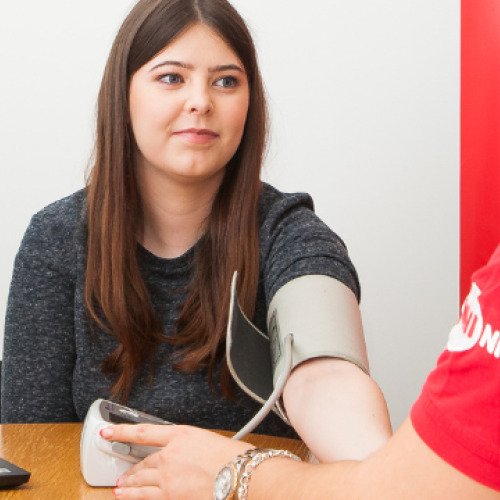If your blood pressure is consistently higher than it should be it is called high blood pressure (or hypertension).
High blood pressure puts pressure on your heart, making it work harder. Over the years high blood pressure slowly damages the blood vessels by making them narrower and more rigid. It can also cause small tears and damage to the insides of the blood vessels.
-
If your blood pressure is consistently higher than it should be it is called high blood pressure (or hypertension).
High blood pressure is not a disease in itself. However, it can lead to an increased risk of heart disease and strokes.High blood pressure puts pressure on your heart, making it work harder. Over the years high blood pressure slowly damages the blood vessels by making them narrower and more rigid. It can also cause small tears and damage to the insides of the blood vessels.
As your blood vessels become more damaged and rigid, your heart has to work even harder to push the blood through your blood vessels and the overall blood pressure rises further. It becomes easier for clots to get caught and for fatty debris (atheroma) to block your blood vessels.
This can result in clots that may travel to the heart or brain and cause a heart attack or stroke. Failure to detect and treat blood pressure can lead to heart attack, heart failure or stroke and other conditions like dementia.
-
When your blood pressure is taken, two measurements are recorded during a single heartbeat. When your blood pressure is written down you will see a top number and a bottom number.
- Systolic Pressure is the top number. This is the pressure when your heart pumps blood through arteries and around your body.
- Diastolic pressure is the bottom number. This is the pressure when your heart is resting in between beats.
Blood pressure is measured in millimetres of mercury or mmHg. When a person has high blood pressure, the numbers on their readings begin to rise above the levels of 140/90mmHg. Ideal blood pressure is between 90/60mmHg and 120/80mmHg.
If your blood pressure is consistently higher than 140/90mmHg then you may have high blood pressure, which is medically known as hypertension.
One reading alone cannot diagnose high blood pressure. It must be recorded over a period of time. Generally, the lower your blood pressure, the healthier you are. But low blood pressure can also be dangerous.
People with a reading of around 90/60 or lower are generally considered to have low blood pressure. For some, there may be an underlying cause that could need treatment.
-
High blood pressure is often related to unhealthy lifestyle habits, such as smoking, drinking too much alcohol, being overweight and not exercising enough. Making changes to your lifestyle will help to reduce your BP. It is also important to take any medication prescribed by your doctor.
High blood pressure can sometimes be inherited from our family. It can also increase with age.
-
Lifestyle changes can help prevent and significantly reduce high blood pressure.
You can help to reduce your blood pressure by:
- Maintaining a healthy weight
- Increasing the amount of fruit and vegetables you eat
- Taking regular exercise and being more active
- Reducing your salt intake
- Limiting the amount of alcohol you drink
Find out more about lifestyle changes you can make to keep healthy:
-
High blood pressure rarely has any symptoms. The only way to know what your blood pressure (BP) is to have it measured.
High blood pressure is more common as you get older so it is important to get it checked regularly.It is recommended that you have your blood pressure checked at least every 5 years, however, if you are at greater risk due to factors such as a family history of high blood pressure, you may wish to get it checked more regularly.
People with type 2 diabetes should have their blood pressure checked annually.
To get your blood pressure checked, make an appointment with your GP or buy a blood pressure machine for home monitoring. Our Well Checks also include a blood pressure check.
Our Well Checks include a blood pressure test as well as a lifestyle assessment and give you the opportunity to speak to one of our qualified health promotion officers about any concerns you have around your health, and receive personalised tips and advice.
Find out moreDownload our Blood Pressure Factsheet:
-
Blood Pressure FactsheetDownload pdf
Blood Pressure Videos
Check out our videos about blood pressure and how to get yours checked so you know if your number's up.

